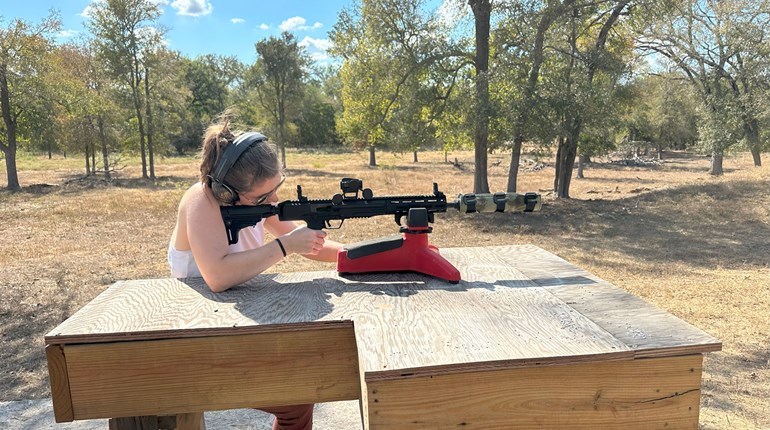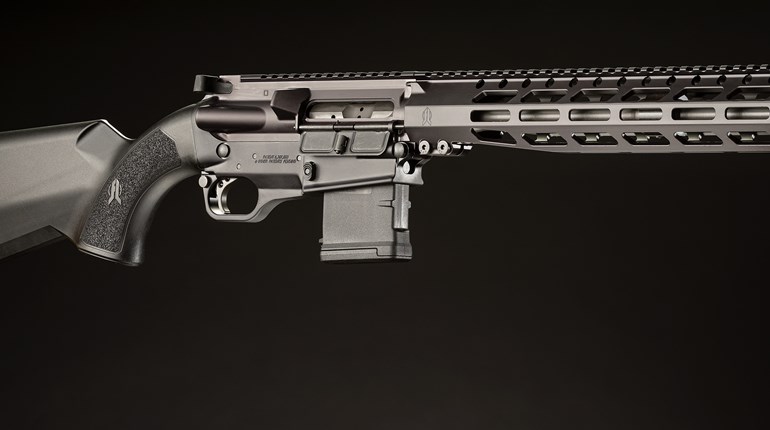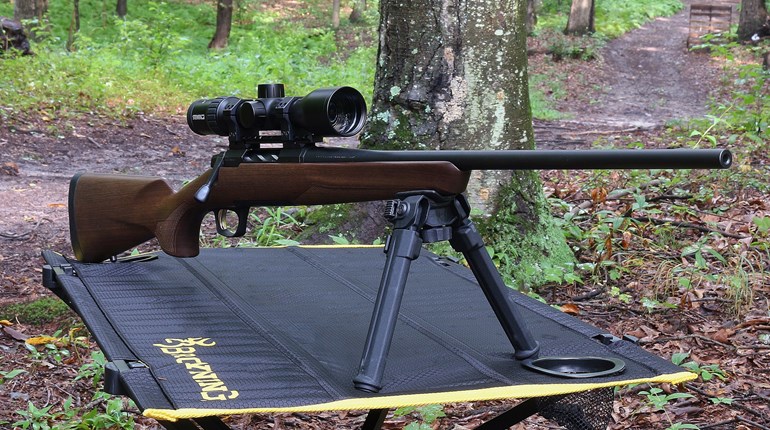
We think it’s accurate to say that gun guys—and ladies—are often camera nuts as well. And if you’re of a certain, shall we say, vintage, the Nikon F1 was the camera to which most of us aspired. Ok, ok—outright coveted. Not only was it a superb artistic tool, but also one tough piece of equipment—beloved of serious pros who couldn’t have their gear folding in the wet, cold, heat or just about anything else.
Come to think of it, that’s a fine pedigree for shooting optics as well.

No wonder, then, that we were happy to have Nikon’s Black Force 1000 1-4x24 30 mm alight on the bench. All but tailor-made for Stoner pattern or similar rifles, it was accompanied by a cantilever-type, single-piece mount that neatly dispensed with any excuses for delay.
Now if you are tuned in even slightly to modern sporting rifles, you’ll recognize that optics for them are plentiful. One-to-four, -six and -eight power optics are the rage in 3-Gun and like venues for good reason: Shooting with both eyes open allows these optics to be unusually good in CQB-style courses of fire, but a quick twist of the magnification ring will take a shooter with even middling equipment out to the practical limit of 5.56/.223 range. That’s good, clean fun any way you slice it, but our point is that it takes some nerve to dive in on the supply side, and the folks at Nikon appear to have ample cleverness up their sleeves.
Speaking of “good” and “clean,” that’s what stuck us from the outset about nearly every aspect of the optic. The glass was a given, naturally—and proved no disappointment—but the adjectives suit well in other applications, too.
Even in good light, we often find ourselves struggling with setting labels, but this was a non-issue on the Nikon. Either because the labels are upsized relative to most, or because of the uncluttered dimensions under the elevation and windage caps, everything is readable. For many this will seem a small thing, but we disagree: Switching back and forth between eye protection and readers (if you need them) is an invitation to forgetting to put eye protection back on, sooner or later. It’d be a pathetic mechanism by which to wind up with an eye injury. It also makes it easier to dial in changes with unambiguous precision. Fewer “sighters”—intended or not—and more hits.

Those controls/caps/adjustments have another modest plus: All knurling will work with gloves on, including the half-stops that mark “off” on the reticle illumination dial. Pay attention to this too: If we have a gripe—albeit a small one—it’s apparent battery life. The Nikon illum runs on readily available, inexpensive CR2032s, but keep some around. While we didn’t grind through a bunch, we have a slight and admittedly subjective impression that the Black Force goes through them a little faster than some theoretically equivalent scopes.
The silver lining here is that you’ll want to wear batteries out. First, because there is enough useful illumination to run the double horseshoe and dot in daylight if you need to—on a shaded target, for instance, where the etched black reticle may not have great definition or contrast. Most competitors in the price class are not up to this, so advantage Black Force.
Second is the design of the reticle itself: Nikon may be onto something with that second outer horseshoe. We’re pretty sure it’s there as a ranging/holdover/lead calculation aid (depending on what part of the inverted horseshoe/s you’re using), but it also seems to excite the neuro-optical concentricity bias better than single horseshoes do. Translation here is therefore “faster.” But keep your wits about you and remember to turn your dot off, and you’ll be fine no matter what.
We very much liked the supplied cantilever mount. These are a commonplace convenience now, but that doesn’t make them all equal. The Nikon is well-relieved, which keeps weight down, and this has been cleverly engineered to yield four grasping/tensioning rings rather than two.

So what? Well, if you’ve mounted more than say, zero, scopes, you’ll know they seem to “roll” (annoyingly) as the last bit of tightening occurs. This means somewhat labored by-guess-and-by-gosh repositioning to account for said roll, and slow, even tightening of the screws (and not beyond the suggested 25 inch-pound limits—these are steel screws in aluminum, after all).
Some folks think it won’t matter much if the reticle isn’t vertical, and you should immediately offer to shoot with money on the line against such innocents. The longer the shot, the more important it becomes for the reticle to be truly erect. Especially if you’ve done some ballistic drop evaluation with your ammo, like the Black Force stadia make possible, you’ll hit better, all-but-guaranteed.
But back to the rings. We think that the splitting of the rings into essentially four rings as opposed to two (though broader) cuts well down on this propensity to roll. In theory, of course, it’s only an advantage once (unless you migrate your scopes a bunch), but if you’ve got other projects, well, you get the hint, right?
Visit Nikon Sporting Optics here; Black Force 1000 MSRP is $399; Cantilever mount is available in flat and 20 MOA version (to provide added elevation for long-range shooting), MSRP is $140.
Frank Winn has been studying arms and their relationship to tyranny, meaningful liberty and personal security all his adult life. He has been a firearms safety/shooting instructor for more than 20 years, and earned state, regional and national titles in several competitive disciplines.


































